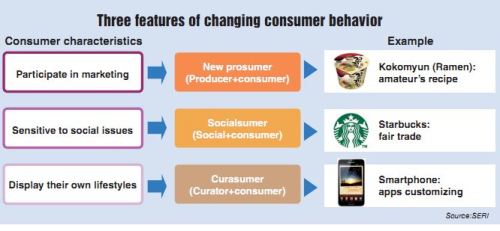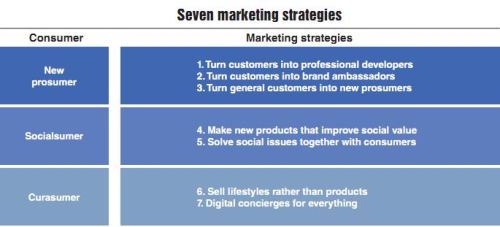As the aftershocks of the global financial crisis languish, financial market uncertainty, rising inflation and falling house values continue to suppress consumer sentiment and slash the spending capacity of Koreans.
Under these circumstances, past spending filled with optimism is fading away. Consumers now search for the lowest prices on staple items. Still, they hone in on coveted products even though they may be expensive.
Consumer interest is also growing in eco-friendly and socially conscious products and services. Furthermore, consumers are having a louder voice then ever in this age of “big data.” When they shop, they use smartphones and social networking sites to obtain product information and raise opinions, and join others in sending after-sale complaints.
In short, consumption has become thriftier, savvier and more proactive. Consumers no longer just spend. They participate in companies’ marketing, respond sensitively to social issues and create their own styles. For companies, actively responding to consumers’ revised shopping behavior will create new demand.
Changes in consumer behavior
The changing consumer behavior has spawned three groups of buyers. First, there are new “prosumers” ― producer plus consumer ― non-experts who end up playing a role in product development and marketing, ultimately helping create value and performance for a company.

The second group, “socialsumers” ― social plus consumer ― engage in social activities to voice opinions and lead changes to benefit society. This trend is in line with the shifting concept of corporate social responsibility, where businesses and society work together to create shared value.
The last group of consumers consists of “curasumers” ― curator plus consumer ― who design and display their lifestyle like exhibition curators.
They resist belonging to any stereotypical market, revamping the original appearance of a product. For example, people remodel their smartphones, customizing screens with apps with distinct styles.

New marketing strategies
1. Turn customers into professional developers
In product planning and development, companies should listen carefully to the demands of prosumers.
Opening up channels for their participation will capture their opinions. This process should add fun factors, stimulate intellectual curiosity and make them feel creative and have a sense of accomplishment.
A case in point is Swiss bag maker Freitag owned by design students-turned-entrepreneurs Markus and Daniel Freitag. Their personal need to carry waterproof bags turned into a business which now has a unique “F-Cut” system that lets customers design and customize their own bags.
2. Turn customers into brand ambassadors
People trust each other more than they trust advertising or a salesperson. To this end, companies can leverage social media by getting satisfied consumers to make positive comments that will reach mass audiences. Happy customers thus become the most influential public relations agents.
One example is Rovio Entertainment, a Finnish mobile entertainment company that has a huge customer base thanks to Angry Birds, its global hit game.
In March, the company set up a flash mob for the launch of its “Angry Birds Space” game. Fans of Angry Birds voluntarily participated and became a critical part of advertising the new version of the game.
3. Turn general customers into new prosumers
Prosumers have been predominately adult male. Companies now need to construct a more diversified customer base, including children and housewives.
By defining key customers for each product category, companies can gather ideas for new products from each customer segment. Hence, a company may make products that it would not have thought of.
4. Make new products that improve social value
The genuine way for companies to be a socially responsible business is to make products that benefit individual customers, companies and the overall society.
Socialsumers tend to have a good impression of companies that engage in not only community services but also manufacture products that help disadvantaged people and resolve social issues.
“Love Pot” is an all-natural eco-friendly humidifier developed in Korea that works without electricity, and became a huge hit. Water in the flowerpot is absorbed into a tissue ball made of natural wool, and is evaporated through air.
Love Pot is pretty in design, easy to use and free of germs. But what makes this product more meaningful is that the manufacturer donates the sales revenue from the humidifier to help children of low-income families.
5. Solve social issues together with consumers
Socialsumers go beyond their individual interests to actively join marketing activities that benefit all of society.
It is thus important for companies to establish channels where customers can actively create shared value.
Google, in celebrating its 10th birthday, opened a $10 million contest to collect suggestions for making the world better, receiving more than 150,000 ideas.
IT service firm Samsung SDS held a public contest called “Smart life, smart work and smart fun that can change the world” to gather ideas for helping needy people.
6. Sell lifestyles rather than products
Rather than rely on a “buy this” approach of direct persuasion, companies can stimulate potential demand by suggesting that “you too can live this life.”
This can be done by supplying information and hands-on experience with products. One example of this is Sweden’s home products company IKEA, whose massive stores create room settings for its furniture and thousands of household products. Customers can easily visualize how they can furnish and decorate their homes before deciding their purchases.
7. Digital concierges for everything
Concierge services have traditionally been a customized service available only to the wealthy. However, the “big data” era now gives ordinary people “suggestions just for me.”
Woodapples, a mobile marketing platform, provides companies publicity via social networking sites. Woodapples helps companies devise marketing campaigns that target certain consumers in one area over a limited time.
By Lee Dong-hun,Research fellow, Samsung Economic Research Institute
This article was contributed by the Samsung Economic Research Institute. ― Ed.
Under these circumstances, past spending filled with optimism is fading away. Consumers now search for the lowest prices on staple items. Still, they hone in on coveted products even though they may be expensive.
Consumer interest is also growing in eco-friendly and socially conscious products and services. Furthermore, consumers are having a louder voice then ever in this age of “big data.” When they shop, they use smartphones and social networking sites to obtain product information and raise opinions, and join others in sending after-sale complaints.
In short, consumption has become thriftier, savvier and more proactive. Consumers no longer just spend. They participate in companies’ marketing, respond sensitively to social issues and create their own styles. For companies, actively responding to consumers’ revised shopping behavior will create new demand.
Changes in consumer behavior
The changing consumer behavior has spawned three groups of buyers. First, there are new “prosumers” ― producer plus consumer ― non-experts who end up playing a role in product development and marketing, ultimately helping create value and performance for a company.

The second group, “socialsumers” ― social plus consumer ― engage in social activities to voice opinions and lead changes to benefit society. This trend is in line with the shifting concept of corporate social responsibility, where businesses and society work together to create shared value.
The last group of consumers consists of “curasumers” ― curator plus consumer ― who design and display their lifestyle like exhibition curators.
They resist belonging to any stereotypical market, revamping the original appearance of a product. For example, people remodel their smartphones, customizing screens with apps with distinct styles.

New marketing strategies
1. Turn customers into professional developers
In product planning and development, companies should listen carefully to the demands of prosumers.
Opening up channels for their participation will capture their opinions. This process should add fun factors, stimulate intellectual curiosity and make them feel creative and have a sense of accomplishment.
A case in point is Swiss bag maker Freitag owned by design students-turned-entrepreneurs Markus and Daniel Freitag. Their personal need to carry waterproof bags turned into a business which now has a unique “F-Cut” system that lets customers design and customize their own bags.
2. Turn customers into brand ambassadors
People trust each other more than they trust advertising or a salesperson. To this end, companies can leverage social media by getting satisfied consumers to make positive comments that will reach mass audiences. Happy customers thus become the most influential public relations agents.
One example is Rovio Entertainment, a Finnish mobile entertainment company that has a huge customer base thanks to Angry Birds, its global hit game.
In March, the company set up a flash mob for the launch of its “Angry Birds Space” game. Fans of Angry Birds voluntarily participated and became a critical part of advertising the new version of the game.
3. Turn general customers into new prosumers
Prosumers have been predominately adult male. Companies now need to construct a more diversified customer base, including children and housewives.
By defining key customers for each product category, companies can gather ideas for new products from each customer segment. Hence, a company may make products that it would not have thought of.
4. Make new products that improve social value
The genuine way for companies to be a socially responsible business is to make products that benefit individual customers, companies and the overall society.
Socialsumers tend to have a good impression of companies that engage in not only community services but also manufacture products that help disadvantaged people and resolve social issues.
“Love Pot” is an all-natural eco-friendly humidifier developed in Korea that works without electricity, and became a huge hit. Water in the flowerpot is absorbed into a tissue ball made of natural wool, and is evaporated through air.
Love Pot is pretty in design, easy to use and free of germs. But what makes this product more meaningful is that the manufacturer donates the sales revenue from the humidifier to help children of low-income families.
5. Solve social issues together with consumers
Socialsumers go beyond their individual interests to actively join marketing activities that benefit all of society.
It is thus important for companies to establish channels where customers can actively create shared value.
Google, in celebrating its 10th birthday, opened a $10 million contest to collect suggestions for making the world better, receiving more than 150,000 ideas.
IT service firm Samsung SDS held a public contest called “Smart life, smart work and smart fun that can change the world” to gather ideas for helping needy people.
6. Sell lifestyles rather than products
Rather than rely on a “buy this” approach of direct persuasion, companies can stimulate potential demand by suggesting that “you too can live this life.”
This can be done by supplying information and hands-on experience with products. One example of this is Sweden’s home products company IKEA, whose massive stores create room settings for its furniture and thousands of household products. Customers can easily visualize how they can furnish and decorate their homes before deciding their purchases.
7. Digital concierges for everything
Concierge services have traditionally been a customized service available only to the wealthy. However, the “big data” era now gives ordinary people “suggestions just for me.”
Woodapples, a mobile marketing platform, provides companies publicity via social networking sites. Woodapples helps companies devise marketing campaigns that target certain consumers in one area over a limited time.
By Lee Dong-hun,Research fellow, Samsung Economic Research Institute
This article was contributed by the Samsung Economic Research Institute. ― Ed.


![[AtoZ into Korean mind] Humor in Korea: Navigating the line between what's funny and not](http://res.heraldm.com/phpwas/restmb_idxmake.php?idx=644&simg=/content/image/2024/04/22/20240422050642_0.jpg&u=)
![[Exclusive] Korean military set to ban iPhones over 'security' concerns](http://res.heraldm.com/phpwas/restmb_idxmake.php?idx=644&simg=/content/image/2024/04/23/20240423050599_0.jpg&u=20240423183955)


![[Herald Interview] Why Toss invited hackers to penetrate its system](http://res.heraldm.com/phpwas/restmb_idxmake.php?idx=644&simg=/content/image/2024/04/22/20240422050569_0.jpg&u=20240422150649)
![[Graphic News] 77% of young Koreans still financially dependent](http://res.heraldm.com/phpwas/restmb_idxmake.php?idx=644&simg=/content/image/2024/04/22/20240422050762_0.gif&u=)






![[Exclusive] Korean military to ban iPhones over security issues](http://res.heraldm.com/phpwas/restmb_idxmake.php?idx=652&simg=/content/image/2024/04/23/20240423050599_0.jpg&u=20240423183955)



![[Today’s K-pop] Ateez confirms US tour details](http://res.heraldm.com/phpwas/restmb_idxmake.php?idx=642&simg=/content/image/2024/04/23/20240423050700_0.jpg&u=)